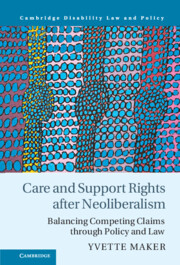Book contents
- Care and Support Rights after Neoliberalism
- Cambridge Disability Law and Policy Series
- Care and Support Rights after Neoliberalism
- Copyright page
- Contents
- Table
- Foreword
- Acknowledgments
- Abbreviations
- Introduction
- Part I Care Policy Tensions
- Part II Balancing Competing Claims through Rights-Based Policy and Law
- Part III Care and Support Policy Tensions in Two Liberal Welfare States
- 6 Income Support for Carers of Children with Disabilities in Australia
- 7 Care, Disability and Gender Equality in Australian Carers’ Income Support
- 8 Incorporating Multiple Options and Perspectives
- 9 Care and Support for Adults in England
- 10 Care, Disability and Gender Equality in English Care and Support Policy
- 11 Maximizing Options and Opportunities
- Conclusion
- Index
- Other Books in the Series
8 - Incorporating Multiple Options and Perspectives
Applying the Care and Support Rights Principles to Carer Payment (Child)
from Part III - Care and Support Policy Tensions in Two Liberal Welfare States
Published online by Cambridge University Press: 21 April 2022
- Care and Support Rights after Neoliberalism
- Cambridge Disability Law and Policy Series
- Care and Support Rights after Neoliberalism
- Copyright page
- Contents
- Table
- Foreword
- Acknowledgments
- Abbreviations
- Introduction
- Part I Care Policy Tensions
- Part II Balancing Competing Claims through Rights-Based Policy and Law
- Part III Care and Support Policy Tensions in Two Liberal Welfare States
- 6 Income Support for Carers of Children with Disabilities in Australia
- 7 Care, Disability and Gender Equality in Australian Carers’ Income Support
- 8 Incorporating Multiple Options and Perspectives
- 9 Care and Support for Adults in England
- 10 Care, Disability and Gender Equality in English Care and Support Policy
- 11 Maximizing Options and Opportunities
- Conclusion
- Index
- Other Books in the Series
Summary
In light of the many shortcomings of Carer Payment (child) policy described in Chapter 7, this chapter explores the potential of the six care and support rights principles to place the interests and claims of carers and children with disabilities on an even footing and realize their citizenship rights to care and support. Many current restrictions on access to this payment would need to be amended to achieve this, including removing the limitation of eligibility to sole carers with intense, constant care loads, reconsidering the income tests and paid work requirements that limit carers’ paid work options, and expanding the ‘care load’ test’s focus beyond individual, medical needs to incorporate the rights and dignity of children and their carers. Other necessary measures would include ensuring that a variety of care and support services are available for all parties and increasing the availability and appeal of flexible working for men and women. Such changes would constitute a major departure from prevailing policy settings and require reform across multiple areas of policy including social assistance, care and support and employment, but the potential benefits of such changes for a range of people with care and support needs and/or responsibilities are clear.
Keywords
- Type
- Chapter
- Information
- Care and Support Rights After NeoliberalismBalancing Competing Claims Through Policy and Law, pp. 171 - 195Publisher: Cambridge University PressPrint publication year: 2022



